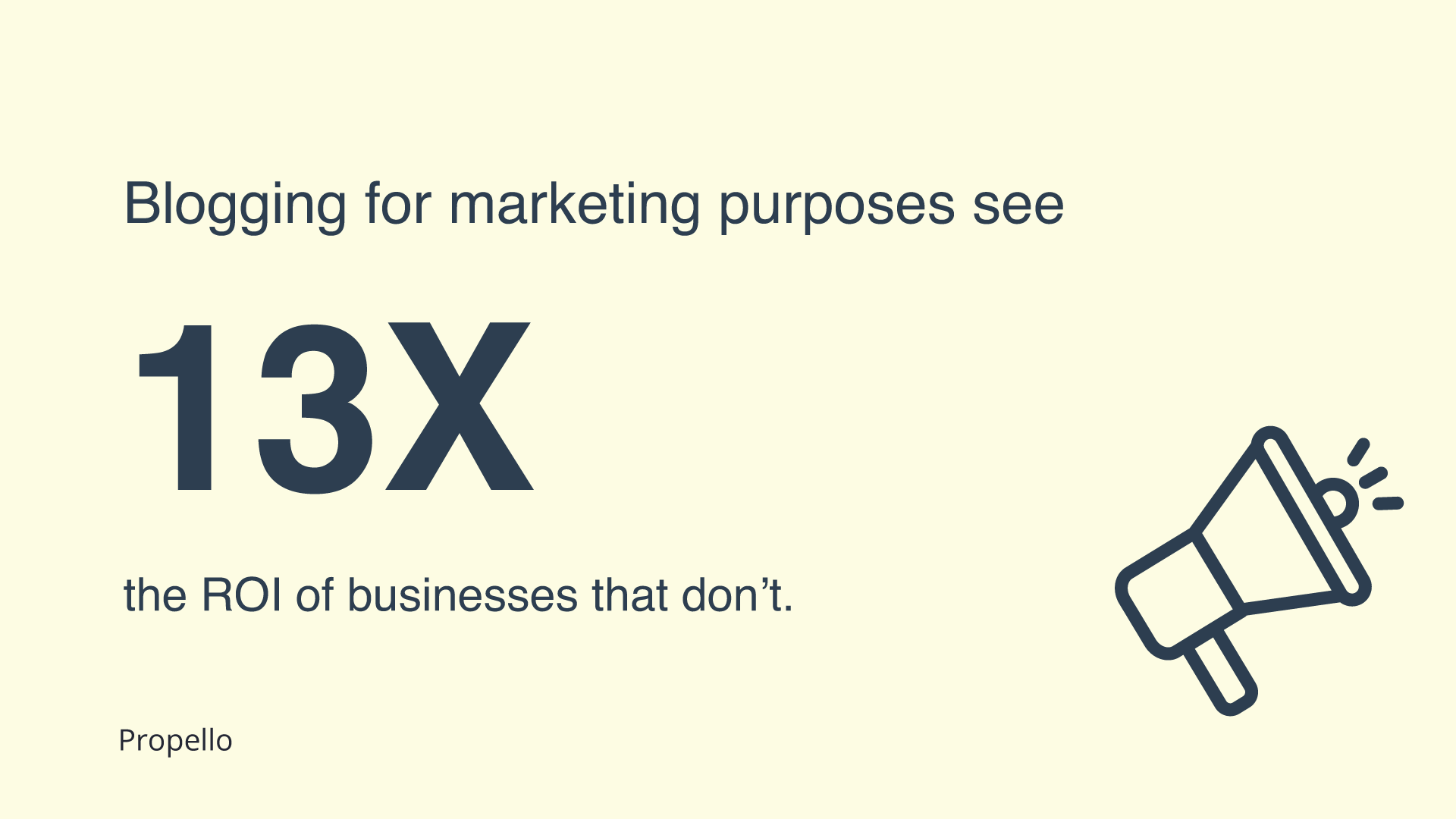Have you ever heard of content marketing? If not, you may be missing out on a powerful tool to grow your business. Content marketing is a buzzword that has been circulating in the digital marketing world for years, but what exactly does it mean?
Content marketing is a strategic approach to creating and distributing valuable, relevant, and consistent content to attract and retain a clearly defined audience. This type of marketing focuses on building a relationship with potential customers by providing them with useful information that they can use.
In today's digital age, content marketing has become a crucial element in any successful marketing strategy. It's not just about selling your products or services, but rather building trust and establishing your brand as a thought leader in your industry.
So, if you're looking to take your business to the next level, it's essential to understand what content marketing is and how it can benefit you.
In this article, we'll explore the ins and outs of content marketing and how it can help you achieve your business goals.
|
Content Marketing Content marketing is a strategic approach of publishing written and visual content on the web, to drive more leads into your business. |
Content Marketing
Content marketing is a strategic approach focused on creating and distributing valuable, relevant, and consistent content to attract, engage, delight, and retain a clearly defined target audience — and, ultimately, drive profitable customer action. The content can be distributed through channels such as social media, blogs, websites, podcasts, apps, press releases, and more.
Content is key to the driving force behind inbound marketing traffic and leads.
Your content needs to get in front of your audience in a way that feels natural. A common way of doing that is to create a content marketing strategy that is centered around your target audience. By taking this approach, your content will come across as more authentic, engaging, and tailored for your audience.
This video by the Content Marketing Institute sums up what content marketing is and how it has evolved:
Why is Content Marketing Important
There are other ways of being on the web than just content marketing, that is right. So, why would you choose that option for your company? Because content marketing is the base for, and a complement to, your other digital marketing strategies.
If you decide to go for Social Media marketing, then you need content that is on point and resonates with your audience. The same thing applies if you opt for email marketing or a corporate blog, content is the key ingredient. Content is king.
With content, you can accomplish business goals, such as educating people on how to use your product or service to solve their problems.
You need to keep in mind that people have the choice of what type of content they will consume nowadays. They are drowning in a sea of information, and you need to provide them with better options if you want them to choose your brand.
With content marketing, your organization can achieve several things including:
- Educate your leads and prospects about the products and services you offer
- Boost conversions
- Build brand loyalty relationships with your customers
- Show how your products and services solve customer problems
- Create a community around your brand
Types of Content Marketing
There are many types of content marketing that you may choose to incorporate into your digital marketing strategy, including the following:
1. Online Content Marketing
Online Content Marketing has become an indispensable tool for any business looking to establish a strong online presence. In simple terms, it refers to anything you post on the internet. However, in a more specific sense, it pertains to the pages on your website.
With the increasing competition online, having a solid content marketing strategy can help your business rank higher on search engine results pages (SERPs), making it easier for you to reach your target audience.
To get the most out of your content marketing strategy, you need to focus on creating high-quality, relevant content that resonates with your target audience. This can be in the form of blog posts, videos, infographics, and other types of content that educate, inform, and engage your audience.
One of the primary benefits of content marketing is that it helps you establish your business as an authority in your industry.
By providing your target audience with valuable information, you can gain their trust and build a long-lasting relationship with them. This, in turn, can lead to increased engagement, brand loyalty, and customer retention.
2. Social Media Content Marketing
Social media has become an indispensable part of our lives, with billions of people using it every day. Social media has become such a popular medium that businesses of all sizes and types have started leveraging it to promote their brand and reach out to their target audience.
By 2027, it is estimated that there will be 6 billion social media users worldwide, making it a powerful tool for businesses to connect with customers.
With the vast array of social media platforms available, it's important to choose the right ones for your business.
For instance, Facebook is an excellent platform for businesses that want to build brand awareness and engage with their customers, while LinkedIn is ideal for B2B companies looking to connect with professionals in their industry.
Instagram and Pinterest are perfect for businesses that want to showcase visually stunning products or services, while Snapchat is great for targeting younger audiences.
However, it's important to remember that social media isn't just about promoting your brand; it's also about building relationships with your customers. By sharing valuable content, responding to comments and messages, and showing that you care about your audience, you can build a loyal following and turn customers into brand advocates.
3. Infographic Content Marketing
Infographic content marketing is a powerful tool that allows businesses to present information, data, and content in a visually compelling way. By combining concise statements with crisp visuals, infographics are an effective way to communicate complex concepts and make them more accessible to a wider audience.
In today's fast-paced digital world, people have limited time to consume information, which is why infographics have become increasingly popular. They offer a quick and easy way for businesses to grab people's attention and convey important messages. Infographics also have a greater likelihood of being shared on social media platforms, increasing the reach of your brand.
When it comes to content marketing, infographics offer several benefits. They can help you establish thought leadership by demonstrating your expertise on a particular topic. Infographics are also highly shareable, which can lead to increased traffic to your website and better brand awareness.
4. Blog Content Marketing
Blogs are a powerful type of inbound content, and they allow a great deal of creativity about their purpose and topics. In 2019, HubSpot found that marketers who prioritize marketing efforts are 13x more likely to see positive ROI.

As a thought leader in digital marketing, it's important to understand the benefits of various types of content marketing strategies. One such strategy is blog content marketing, which can help your business see a positive return on investment.
According to HubSpot's 2019 research, marketers who prioritize blog content marketing efforts are 13x more likely to see positive ROI.
Blogs are a powerful type of inbound content that allows for a great deal of creativity in terms of purpose and topics. With blogs, you can promote other in-house and external content through links, add social sharing buttons, and integrate product information. This can help boost brand awareness, drive traffic to your website, and generate leads.
Creating blog content costs 62% less than traditional marketing and generates about 3 times as many leads. By consistently publishing high-quality blog content that resonates with your target audience, you can establish your brand as a thought leader in your industry, and build a loyal community of followers who trust your expertise and insights.
So, if you're looking to boost your content marketing efforts, incorporating a blog into your strategy is a great place to start. By doing so, you can reap the benefits of increased brand awareness, lead generation, and thought leadership.
5. Podcast Content Marketing
Podcast content marketing is a rapidly growing field, with over 2 million podcasts and more than 66 million podcast episodes currently available. According to research, 38% of listeners report purchasing products or services mentioned in podcasts, making it an increasingly important platform for businesses to consider.
One reason for the popularity of podcasts is the freedom and creativity they provide. Podcasts can cover just about any topic, allowing businesses to showcase their expertise uniquely.
Additionally, businesses have control over other factors related to podcasting, such as episode cadence, guest selection, promotion strategies, and episode length.
Starting a podcast can be an excellent way for businesses to reach new audiences, build brand loyalty, and establish themselves as thought leaders in their industry. Whether you are promoting a product or service or just sharing valuable information, podcasts can be a powerful marketing tool.
6. Video Content Marketing
Video content marketing has a tremendous impact on sales, with 84% of people saying that they’ve been convinced to buy a product or service by watching a brand’s video. With the rise of video platforms like YouTube and TikTok, it's easy to see why.
One of the main benefits of video marketing is its ability to boost conversions and increase return on investment (ROI). This is because video allows you to engage with potential customers in a more personal and memorable way than other types of content. Whether you're sharing a product demo, customer testimonial, or brand story, video can help you establish a deeper connection with your audience.
If you're new to video content marketing, it can be helpful to start with some effective sales video examples.
7. Paid Ad Content Marketing
Paid advertising has become an increasingly popular strategy in the world of marketing. It provides a means to reach a wider audience and allows you to position your brand in all the places where you want to be seen. When used in conjunction with inbound marketing, it can be a powerful tool to attract new leads and customers.
There are many different platforms and channels available for running paid advertising campaigns. Some of the most popular include search engines, social media platforms, landing pages, and sponsored content. Each of these options has its strengths and weaknesses, so it is important to choose the right channels based on your marketing goals and target audience.
For example, if you are looking to drive more traffic to your website and increase brand awareness, search engine advertising might be a good option for you. On the other hand, if you are looking to target a specific audience on social media, paid social advertising might be more effective.
How content marketing works
Content marketing is a powerful tool that businesses can use to generate leads, build brand awareness, and drive sales. It involves creating and distributing valuable, relevant, and consistent content to attract and retain a clearly defined audience, with the ultimate goal of driving profitable customer action.
To make content marketing work effectively, it is essential to provide relevant content at every stage of the customer journey.
To effectively use content marketing, it is essential to provide relevant content at every phase of the buying journey. Companies are using content marketing at every step of the sales cycle to attract and convert potential customers.
Here's how companies are using content marketing at every step of the sales cycle to attract and convert.
Awareness stage
In the early stages of the sales process, the focus should be on the audience's main concerns to create awareness.
To connect with the audience, it is crucial to write about their pain points, challenges, and questions. At this stage, the content should be informative and not sales-focused. This can include how-to blogs, videos, and newsletters that address the audience's concerns and offer valuable information.
By doing so, potential customers will become aware of the brand's existence and begin to build trust with the company.
Consideration stage
Once potential customers are aware of the brand's existence, they move to the consideration stage. At this stage, they are considering various options and evaluating whether the brand's product or service is right for them. The content should focus on the benefits of the product or service and differentiate the brand from competitors.
The content should be persuasive and informative, providing insights into how the product or service can solve the potential customer's problems. Case studies, webinars, and white papers are effective types of content for this stage.
By doing so, potential customers will start to perceive the brand as a valuable and reliable solution to their problem.
Decision stage
At the decision stage, potential customers are ready to make a purchase decision. The content should focus on why the brand is the best option for the potential customer. The content should also provide information about the features, pricing, and benefits of the product or service.
At this stage, the content should have a clear call-to-action, such as signing up for a free trial, booking a demo, or making a purchase. Testimonials, product comparisons, and product demos are effective types of content for this stage.
By doing this, potential customers will feel confident in their decision to choose the brand over competitors.
Content is the way to go
Content marketing is a powerful way to connect with potential customers, build brand awareness, and increase sales. In this blog post, we've provided you with valuable insights into what content marketing is and why you should consider developing your content strategy.
Remember that content marketing is a long-term strategy that requires patience and dedication. It may take time before you see the results, but the benefits are worth the investment.
At Fine Media, we understand the importance of a solid content marketing strategy, and we're here to help you achieve your business goals. As a team of Hubspot-certified content marketing experts, we've helped numerous brands grow their organic traffic and establish themselves as thought leaders in their industry.
If you're ready to take your content marketing to the next level, contact Fine Media today. We'll work with you to create a tailored strategy that meets your specific needs and objectives. Let's take your brand to the next level together.



